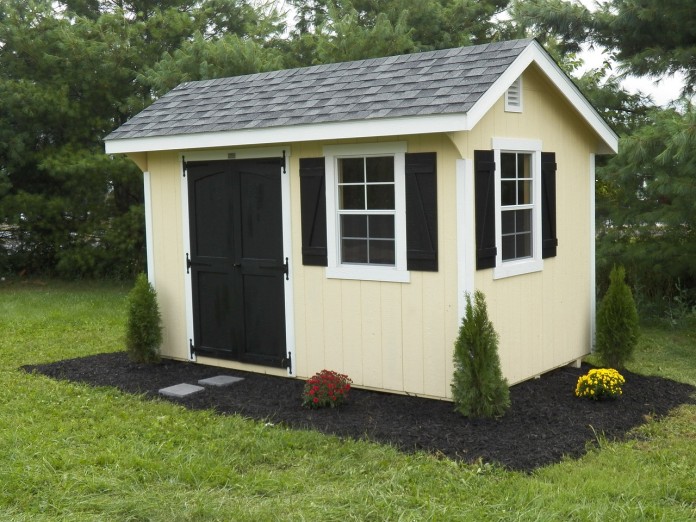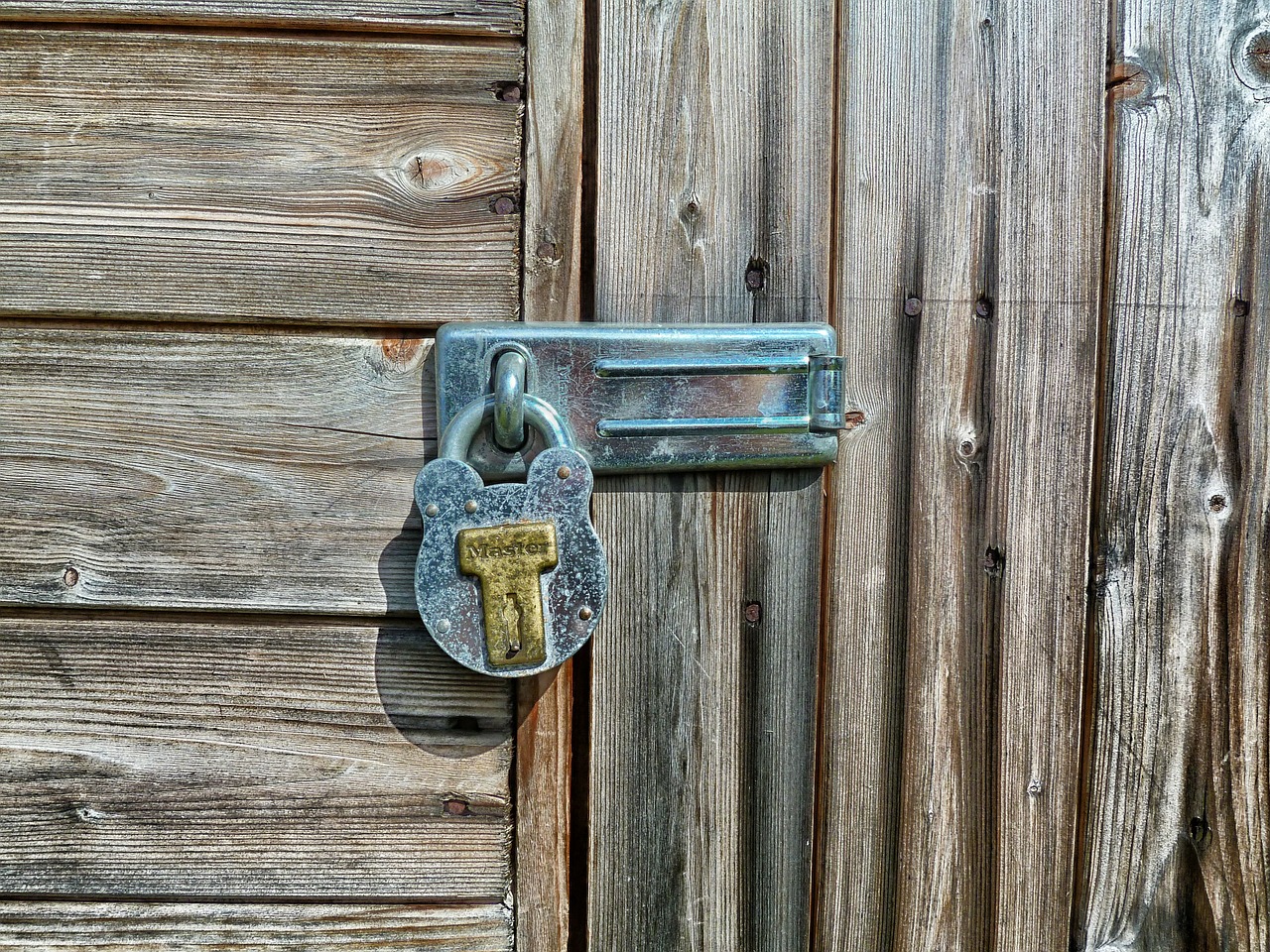What the UK lacks in size, it makes up for in eccentricity. Which of our national quirks reflects this better than our enduring, bewildering relationship with garden sheds. We boast (and what a boast it is) the highest concentration of sheds on the planet, with over 11 million of them standing proudly in gardens across the UK.
The cultural role of these unlikely sanctuaries grows more integral and more inexplicable every day. Housing everything from potting equipment to fully functioning bars, they are an expression of creativity, masculinity, and Britishness, and no one is more confused about it than the Americans.
What the US boasts in size, it expresses in size. While we forage around our little-understood back garden burrows, our American counterparts have a typically supersized alternative: the self storage unit. With 80% of all the world’s storage units occupying over 2.3 billion square feet of American soil, the States has the highest concentration of self-storage anywhere on Earth.
So, just like pitting lifts against elevators, David Brent against Michael Scott, or the Redcoats against the Patriots, let’s once again take Britain and America into battle. It’s time to see who is doing self-storage better.
Running a business, who is more successful?
Sheds:
Garden shed based businesses are thought to have contributed up to £8bn to the UK GDP in 2014. While it’s almost impossible to strip sheds of their mystical, romantic status, not all of this revenue will have come from freezing writers, damp artists and reclusive musicians without a rehearsal garage. There is an increasingly diverse range of businesses operating from domestic sheds, including bakeries, beauty salons and even pole dance studios.
For many Sheddies (a term coined with the sole purpose of baffling non-Brits), these spaces are not only quaint and convenient, but also cheap. Nestled away in back gardens, startups who operate exclusively online are excused from paying business rates (that’s corporate tax to those in the States). If, however, your shed undergoes a radical business-focused transformation—the aforementioned beauty salon, for example—and people buy products or services from you onsite, then, as chartered accountants Three Wise Bears point out, may make your small business liable to additional taxes.
Not everyone is a fan of this back garden style of business. Jerry Schurder, head of business rates advisories Gerald Eve, has observed that brick-and-mortar high street retailers are effectively subsidising online competitors, including those run from sheds, through “disproportionately high” taxes.
Self-Storage Units:
According to storage industry research, one in every five storage units is used as a practice or work space. Unlike our fondness towards British bohemian Sheddies, the research describes in unhappy tones how “weak management” has led to units being colonised by irresponsible, unwanted artists.
Some roller-shutter storage doors are more open to artists and businesses than others. The above research cites Greenbox storage, who encourage business customers by supplying conference rooms, desks and wi-fi. As with shed based businesses, a lot more lenience is given to online business owners, who are using the space to keep stock, fulfill orders and organise shipments.
An article from Honolulu Magazine exploring the secret lives of storage units showed everything from personal trainers and bike repair companies, to licensed divorce attorneys operating from inside these small metal rooms.
However, there are many more examples of self-storage entrepreneurs being left vulnerable to eviction and prosecution due to harsher state laws and company policies. Carlos Diaz, the vice president and manager of a storage facility in Florida, was clear that most American storage leases maintain that a self storage facilities is “not meant to be used as an operating business”.
These marmite (or US equivalent)-like attitudes do seem to err against businesses running out of self storage units, with more regulations being put in place to deter entrepreneurs than encourage them. A shed is a cheaper open, even with the additional financial strains of business rates, and is a much safer legally.
Shed: 1
Storage Unit: 0
Is our Shed of the Year contest better than Storage Wars?
Sheds:
Periodically, someone will make the mistake of thinking of the British as “basically Americans with fewer guns but more alcoholism”. It’s a mistake which never lasts long, because every July the Shed of the Year contest comes around, and all common ground immediately disappears beneath yards of decking and hand-made garden furniture.
There are so many reasons Shed of the Year is so ruddy fantastic. There are sheds which look like the Tardis, there are sheds which contain entire pubs, some sheds are made out of boats and some sheds are boats (2013 was an incredible year for competing sheddies). Have you ever felt such a sense of national pride? I thought not.
Self-Storage Units:
With over 5.1 million viewers in 2011, no one can deny (or explain) the popularity of the American TV show Storage Wars. It has international appeal in a way that sheds have not quite achieved, and was broadcast as far as Austria and India.
For those who don’t know, the premise of the show is a team of professional buyers trying to uncover and bid for treasures in repossessed storage units. People loved it, but in 2012 the show was accused of being rigged and taken to court by a former cast member. According to the lawsuit, items were planted in the units, and some bidders were allegedly scripted and told what to bid on.
Then in 2015, while a delightful Scottish craftsman, Walter Micklethwait, was winning UK Shed of the Year, the Storage Wars crew were filmed brawling. It lost the show fans, viewers and has effectively handed this round over to the British garden shed on a dusty silver platter that would probably fetch a few grand in an auction.
Shed: 2
Storage Unit: 0
Criminal activity: Who has the most outrageous outhouse?
Sheds:
The severity of some reported shed crime is subjective. Instant noodles, considered by many to a culinary crime, were first conceived in a Japanese shed in 1958. Barnes Wallis invented the bouncing bomb in his garden shed, and tested it on his garden pond; not criminal under the circumstances (the Second World War) but controversial nonetheless.
Shed crime has become no less varied in the years since, with reports covering everything from construction and trade of lethal weapons, to a criminal postman hiding letters he was “too lazy to deliver”.
However, sheds are much more likely to be a victim of crime than an incubator of it. A well known storage place for valuable power tools and bikes, break-ins are not uncommon. There was even an incident in Devon where an entire shed was stolen, not something that authorities are used to dealing with. Banham security services sent out advice to London shed-owners over the summer to be vigilant against shed crime, and even extend their home alarm systems to protect them.
Self-storage Units:
Unlike sheds, the security of our goods inside a self storage unit is almost completely out of the paying owner’s own hands. They do, of course, still have basic responsibilities such as locking up and reporting suspicious behaviour, but otherwise it’s up to storage unit companies to provide protection.
Self-storage units are often targeted by thieves. Occasionally, and with hope in their hearts, organised gangs raid storage facilities looking for valuables which are not likely to be reported missing right away, perhaps spurred on by the site of treasures uncovered during a totally-not-scripted episode of Storage Wars.
Lockable metal roller doors, 24-hour surveillance and on-site staff are all security features which storage units depend on to provide adequate protection from crime. However, they are not enough to keep out all criminals.
Adultery is still illegal in 21 states across America, and storage units are a much cheaper alternative for secretive couples than the sleazy confines of hotel rooms. Reports and personal anecdotes on this decidedly niche misuse of storage units appear frequently in the press, ranging from agony aunt columns to astonished staff, tired of stumbling across makeshift “love nests”.
Of course, there is no telling how many affairs and love nests Britain is hosting in its own back gardens. We can, however, argue that the noble efforts of self-storage companies’ around-the-clock security earns them the win in round 3!
Shed: 2
Storage Unit: 1
Conclusion: With their rich and occasionally noble heritage, sheds are the clear winners. They are an incubator for innovation, inspiration and culture, whereas our research has shown that storage units are the inspiration for shoddy reality shows and dodgy extra-marital affairs. Long live the humble garden shed.
Find a Home-Based Business to Start-Up >>> Hundreds of Business Listings.






















































